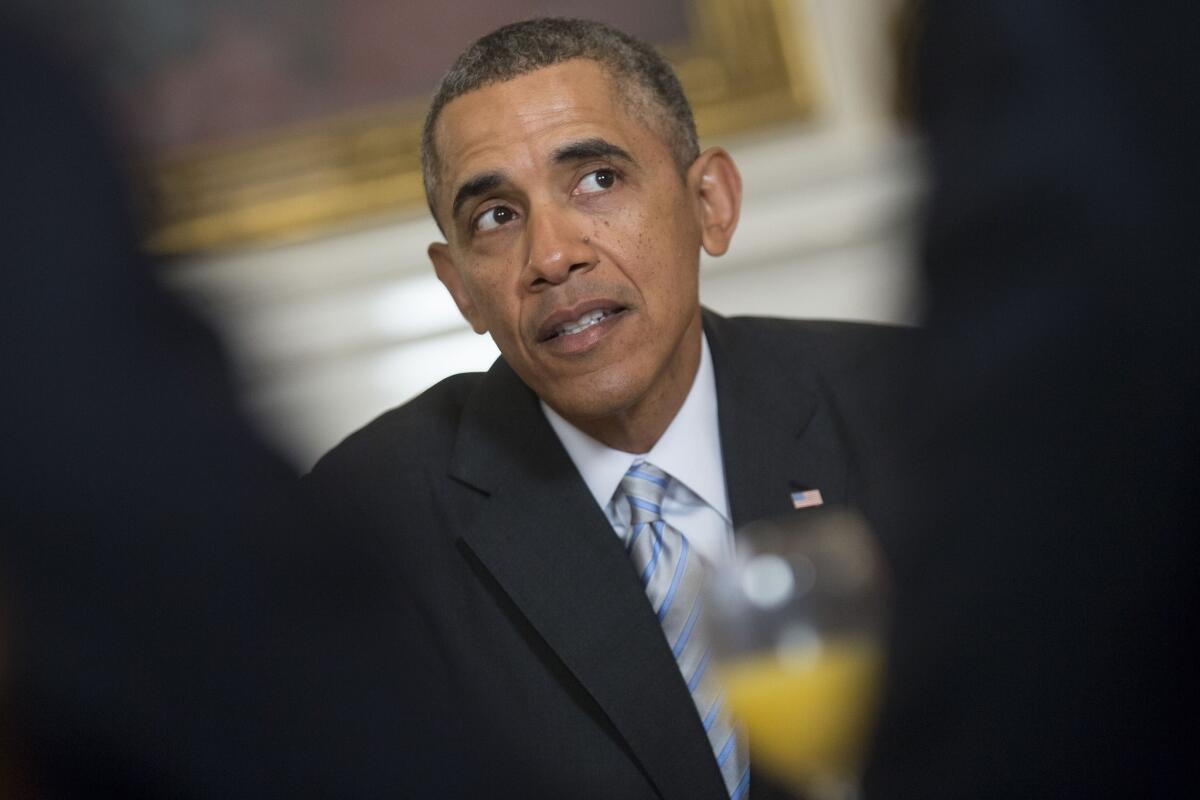President Obama’s budget: Last rites for a ‘grand bargain’

- Share via
President Obama’s decision to drop his pursuit of “chained CPI” -- a less generous method for calculating cost-of-living adjustments to federal benefits and income tax brackets -- sent deficit hawks into an emotional tailspin. For example, Maya MacGuineas, president of the Committee for a Responsible Federal Budget, said, “We are incredibly disappointed to learn that the president has decided to drop his proposal to correct the way in which the federal government measures inflation.”
The proposal is probably the biggest concession Obama is making to Republicans, even though it in effect raises taxes (by allowing more taxpayers to creep into higher brackets) even as it slows the growth of some entitlement spending (by lowering cost-of-living adjustments). So taking it off the table is, indeed, a setback for those who crave a bipartisan deal to put Washington’s fiscal house in order.
To me, though, Obama’s move isn’t the problem; it’s a symptom of the problem. Namely, that Washington simply isn’t capable of making the sort of compromises necessary to address the federal government’s long-term fiscal challenges. Not today, at least. And while that’s a chilling thought in some respects, it’s not entirely bad news.
Although the huge deficits run up since 2008 have several sources, the biggest factors have been a drop-off in tax revenue and an increase in spending on safety-net programs and stimulus measures. Those issues are resolving themselves as the economy recovers. Within the coming decade, however, costs associated with the aging population and healthcare entitlements threaten to send the deficit back up, causing the debt to grow faster than the economy again -- an unsustainable state of affairs.
Fixing the long-term problem means reining in spending on healthcare entitlements such as Medicare and Medicaid. Democrats haven’t been willing to trim benefits, however, unless Republicans agree to raise taxes on the wealthy and on corporations, which the latter hasn’t been willing to do. Hence the need for a “grand bargain” on entitlements, taxes and spending that’s equally unpalatable to both sides.
Obama offered to switch to chained CPI (a move that, for the record, The Times’ editorial board had mixed feelings about) as part of his approach to a grand bargain. But interest in such a deal has faded steadily in the last year as the economy has improved and short-term budget deficits have shrunk. So too has the appetite in Congress for the high-stakes budget brinkmanship that accompanied the previous efforts to fashion a long-term deficit-reduction plan.
The negotiations over a budget resolution for fiscal 2014 are a good illustration of lawmakers’ dwindling ambitions. The competing resolutions passed by the GOP-controlled House and the Democratic-controlled Senate provided a perfect template for a grand bargain: Republicans wanted to cut spending and benefits; Democrats wanted a higher level of spending financed by increased corporate tax payments.
Rather than try to find middle ground on those big ideas, however, House Budget Committee Chairman Paul D. Ryan (R-Wis.) and Senate Budget Committee Chairwoman Patty Murray (D-Wash.) cut a small-bore deal in December that split the difference on the short-term spending numbers while largely ignoring entitlements and taxes. And many of their colleagues embraced the deal because it avoided the drama of another fight over whether to shut down federal agencies, as happened disastrously in October.
The same mentality has prevailed this year, as Congress has approved major spending bills and a one-year increase in the debt limit with surprisingly little wailing and gnashing of teeth.
So rather than writing a fiscal 2015 budget positioned for another round of grand bargain talks, Obama apparently is writing one aimed purely at the next election. Presidential budgets are, after all, more like party platforms than governing blueprints; they’re not binding, and Congress typically ignores all of the more controversial policy proposals they contain.
The new Obama budget reportedly will put the president back on ground that’s comfortable for Democrats, calling for higher spending on some programs, less spending on others and higher taxes on multinational corporations to make it all fit within last year’s budget deal. The proposals will go nowhere, but then, so did Obama’s call for a grand bargain built around chained CPI.
The consolation prize for the rest of the country is that the bipartisan budget and debt-ceiling deals all but guarantee that there will be no manufactured crises in Washington to hinder the economy’s recovery. And instead of raising hopes for a long-term deficit-cutting plan that simply won’t come, Obama’s budget proposal for fiscal 2015 will just remind voters how different Democrats’ priorities are from Republicans’.
ALSO:
Gun control made harder in California
The Iran I saw -- in 781 days in Evin Prison
Follow Jon Healey on Twitter @jcahealey and Google+
More to Read
A cure for the common opinion
Get thought-provoking perspectives with our weekly newsletter.
You may occasionally receive promotional content from the Los Angeles Times.







